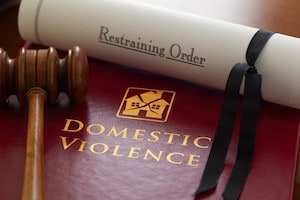Defending You Against False Allegations
The Law Office of Joshua R. Bourne is experienced in defending individuals from false allegations in a domestic violence restraining order. Domestic violence cases will impact child custody and visitation orders. We handle domestic violence criminal defense, defense against criminal protective orders, defense against civil restraining orders, defense against CLETS domestic violence restraining orders (once the court makes a domestic violence restraining order, the order is entered into a statewide computer system called CLETS that all law enforcement officers have access to), move out orders, child custody cases, divorce, and all aspects of family law. A CLETS criminal domestic violence restraining order may be sought in your case preventing you from all contact with the alleged victim. You often have a right to a hearing on a domestic violence restraining order. If you do not attend the hearing, the judge may enter the CLETS restraining order against you without you even being present.This restraining order may prevent you from going home to your family. A domestic violence restraining order will also affect child custody and visitation. A domestic violence restraining order may prevent you from operating or owning a firearm which could cause you to lose your livelihood if you are in the military or have a job requiring use of a firearm.
Abuse is defined as any of the following:
- Intentionally or recklessly causing or attempting to cause bodily injury.
- Sexual assault.
- Placing a person in reasonable apprehension of imminent serious bodily injury to that person or to another.
- Engaging in any behavior that has been or could be illegal such as molesting, attacking, striking, stalking, threatening, battering, harassing, destroying personal property, contacting the other by mail, telephone, or otherwise, disturbing the peace of the other party.
To obtain a Domestic Violence Restraining Order an individual must have, or have had, a close personal relationship with you. Under the law, a relationship is defined as “close” if at least one of the following is true:
- The victim is married or was formerly married to you.
- The victim has or formerly had an engagement or dating relationship with you.
- The victim and you have a child or children together.
- The victim are related to you by blood, marriage or adoption (mother, father, in-laws, siblings, adult children).
- The victim and you are living together, or formerly lived together, as members of a “household.”
The restraining order can include the following:
- restraints on personal conduct by the batterer
- orders for the batterer to stay away from the victim’s home or work and children’s school
- orders for the batterer to be removed from the residence
- child custody and visitation and support orders and other miscellaneous orders
Filing and Prosecuting Restraining Orders
The Law Office of Joshua R. Bourne is also skilled at filing and prosecuting domestic violence restraining orders if necessary in a family law case. A domestic violence restraining order is a court order that helps protect people from abuse or threats of abuse from someone they have a close relationship with.
We can help you request a domestic violence restraining order if:
- A person has abused (or threatened to abuse) you
- AND You have a close relationship with that person. You are:
- Married or registered domestic partner
- Divorced or separated
- Dating or used to date
- Living together or used to live together
- Parents together of a child
- OR Closely related (parent, child, brother, sister, grandmother, grandfather, in-law).
If you are a parent and your child is being abused, the Law Office of Joshua R. Bourne can also file a restraining order on behalf of your child to protect your child (and you and other family members). If you do not qualify for a domestic violence restraining order, there are other kinds of orders you can ask for:
- Civil harassment restraining order (can be used for neighbors, roommates, coworkers, or more distant family members like cousins, uncle or aunt, etc.).
- Elder or dependent adult abuse restraining order (if the person being abused is 65 or older; or between 18 and 64 and a dependent adult).
- Workplace violence restraining order (filed by an employer to protect an employee from violence, stalking, or harassment by another person).
A restraining order is a court order. It can order the restrained person to:
- Not contact or go near you, your children, other relatives, or others who live with you
- Stay away from your home, work, or your children’s schools
- Move out of your house (even if you live together)
- Not have a gun
- Follow child custody and visitation orders
- Pay child support
- Pay spousal or partner support (if you are married or domestic partners)
- Stay away from any of your pets
- Transfer the rights to a cell phone number and account to the protected person (read more)
- Pay certain bills
- Not make any changes to insurance policies
- Not incur large expenses or do anything significant to affect your or the other person’s property if you are married or domestic partners
- Release or return certain property and
- Complete a 52-week batterer intervention program.
Contact the Law Office of Joshua R. Bourne for a free initial consultation regarding your restraining order issues.
